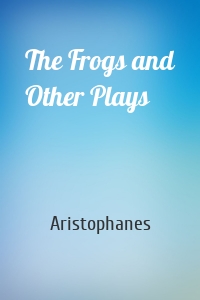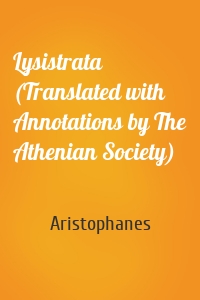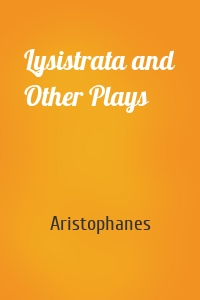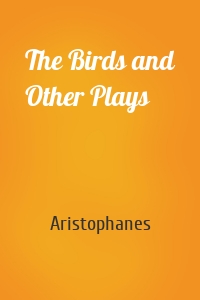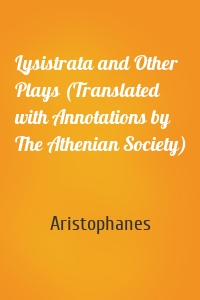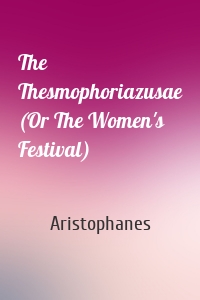Aristophanes
34 кн.
The Frogs and Other Plays
Aristophanes, often referred to as “The Father of Comedy”, is an ancient Greek poet and playwright who is credited with helping to create the art of satire and irony. Of the over forty plays Aristophanes wrote during his lifetime only eleven survive to this day of which five are collected together here in this volume.“The Wasps” is a play which satirizes the Athenian general Cleon, a popular contemporary demagogue, and the Athenian courts which empower him. “The Thesmophoriazusae” depicts a...
| Автор | Aristophanes |
The Knights
In many respects 'The Knights' may be reckoned the great Comedian's masterpiece, the direct personal attack on the then all-powerful Cleon, with its scathing satire and tremendous invective, being one of the most vigorous and startling things in literature. Already in 'The Acharnians' he had threatened to «cut up Cleon the Tanner into shoe-leather for the Knights,» and he now proceeds to carry his menace into execution, «concentrating the whole force of his wit in the...
| Автор | Aristophanes |
The Complete Plays
This comprehensive compilation of Aristophanes' texts, «The Complete Plays of Aristophanes» contains eleven unique stories all penned by the famously witty Greek playwright. His works are also important because they are some of the last remaining forms of Old Comedy in existence. The plays are filled with all kinds of satire, ranging from politics and sex to the humorous portrayals of popular Greek figures. «The Clouds» depicts the philosopher Socrates as a sneaky old man with a penchant...
| Автор | Aristophanes |
The Wasps
This Comedy, which was produced by its author the year after the performance of 'The Clouds,' may be taken as in some sort a companion picture to that piece. Here the satire is directed against the passion of the Athenians for the excitement of the law-courts, as in the former its object was the new philosophy. And as the younger generation—the modern school of thought—were there the subjects of the caricature, so here the older citizens, who took their seats in court as jurymen day by...
| Автор | Aristophanes |
Lysistrata (Translated with Annotat...
Greek playwright, Aristophanes, lived during the 5th and 4th century BC and is considered one of the principal authors of the Greek classical period. Of the nearly thirty plays he wrote during his career, eleven are extant. Amongst the most famous of these is “Lysistrata,” a comedy which focuses on the women of Greece whose husbands have left for the Peloponnesian War. The women do not care about the conflict as much as they care about missing their husbands. Its titular character, Lysistrata,...
| Автор | Aristophanes |
Lysistrata and Other Plays
Greek playwright Aristophanes spins wonderful stories combining politics, satire, and classic Greek gods in this collection of «Lysistrata and Other Plays.» «Lysistrata» focuses on the women of Greece whose husbands leave for the Peloponnesian War. The women do not care about the war as much as they care about missing their husbands; Lysistrata also insists that men rarely listen to women's reasoning and exclude their opinions on matters of the state. In retaliation, the women of Greece...
| Автор | Aristophanes |
The Birds and Other Plays
Aristophanes, often referred to as “The Father of Comedy”, is an ancient Greek poet and playwright who is credited with helping to create the art of satire and irony. Of the over forty plays Aristophanes wrote during his lifetime only eleven survive to this day of which six are collected together here in this volume. In “The Acharnians”, there is the story of Dikaiopolis, an Athenian who brokers a private peace treaty with the Spartans. “The Knights” satirizes Athenian society and politics...
| Автор | Aristophanes |
Lysistrata and Other Plays (Transla...
Greek playwright, Aristophanes, lived during the 5th and 4th century BC and is considered one of the principal authors of the Greek classical period. Of the nearly thirty plays he wrote during his career, eleven are extant. Amongst the most famous of these is “Lysistrata,” a comedy which focuses on the women of Greece whose husbands have left for the Peloponnesian War. The women do not care about the conflict as much as they care about missing their husbands. Its titular character, Lysistrata,...
| Автор | Aristophanes |
The Ecclesiazusae (Or Women In Coun...
The 'Ecclesiazusae, or Women in Council,' was not produced till twenty years after the preceding play, the 'Thesmophoriazusae' (at the Great Dionysia of 392 B.C.), but is conveniently classed with it as being also largely levelled against the fair sex. "It is a broad, but very amusing, satire upon those ideal republics, founded upon communistic principles, of which Plato's well-known treatise [‘The Republic’] is the best example.—From the introduction to ‘The...
| Автор | Aristophanes |
The Thesmophoriazusae (Or The Women...
Like the 'Lysistrata,' the 'Thesmophoriazusae, or Women's Festival,' and the next following play, the 'Ecclesiazusae, or Women in Council' are comedies in which the fair sex play a great part. In ‘The Thesmophoriazusae’ Euripides is summoned as a notorious woman-hater and detractor of the female sex to appear for trial and judgment before the women of Athens assembled to celebrate the Thesmophoria, a festival held in honour of the goddesses Demeter and...
| Автор | Aristophanes |


